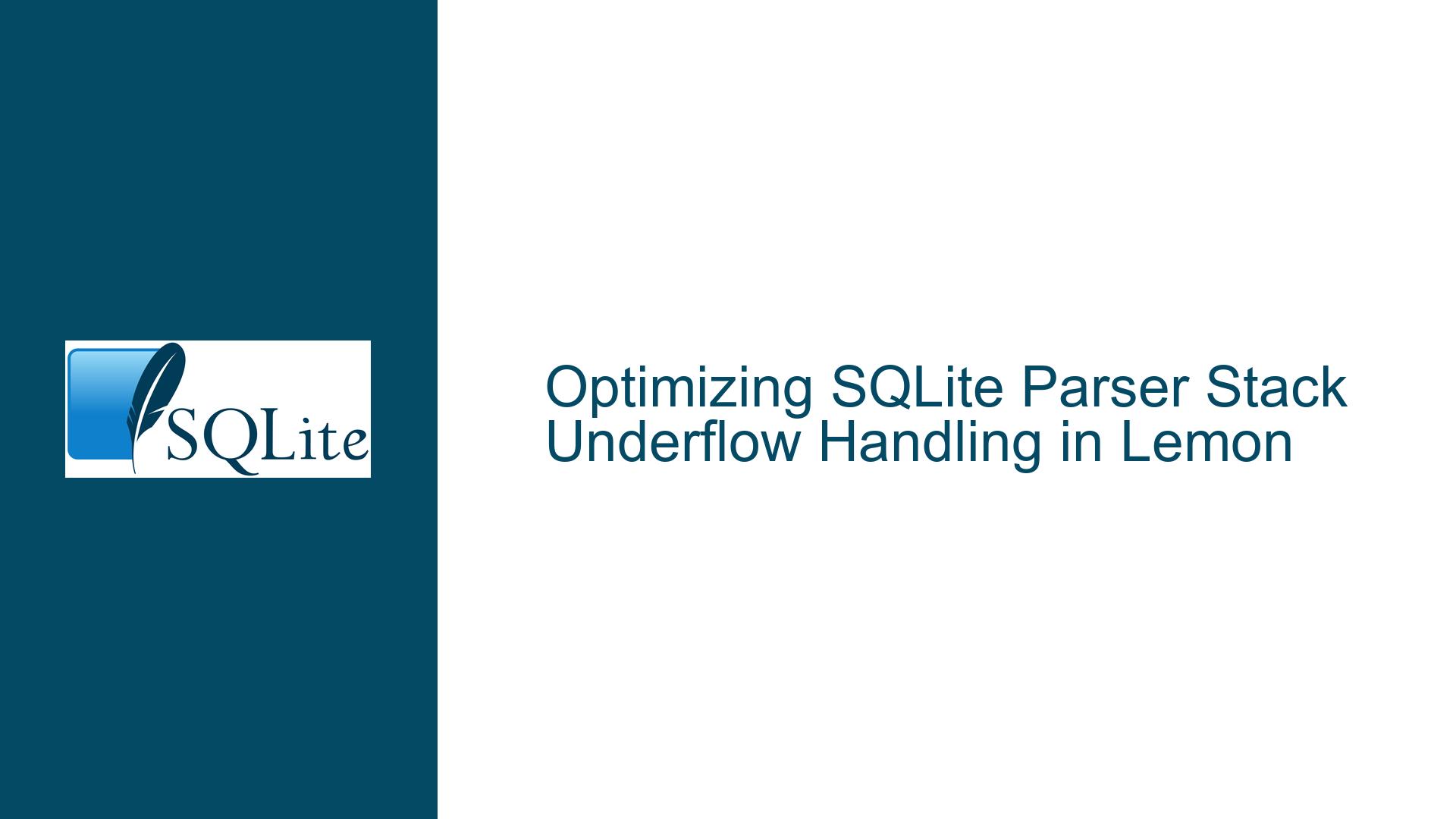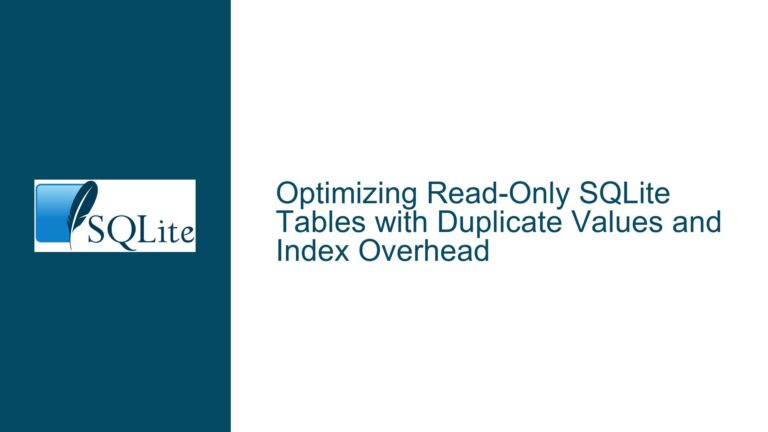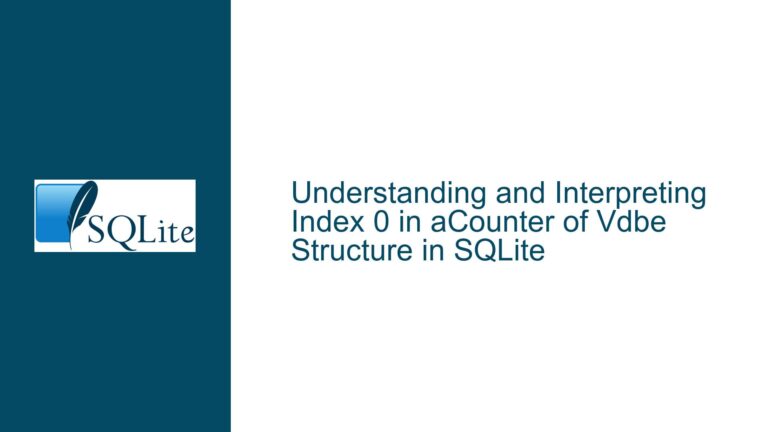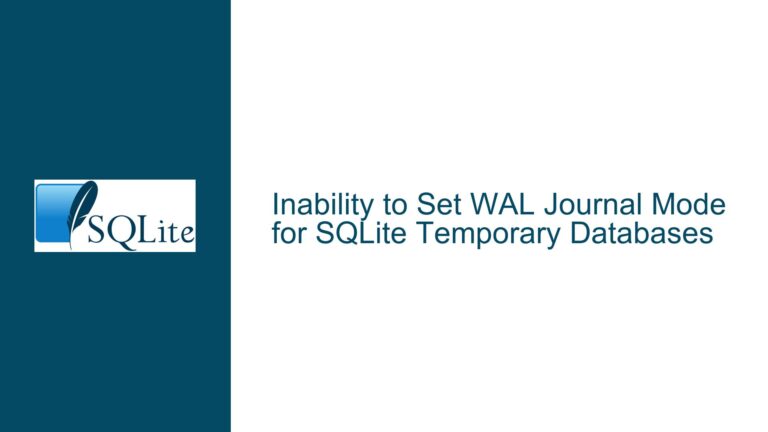Optimizing SQLite Parser Stack Underflow Handling in Lemon
SQLite Parser Stack Underflow Detection in Lemon
The SQLite parser, generated by the Lemon parser generator, employs a stack-based mechanism to manage parsing states and transitions. One critical aspect of this mechanism is the detection of stack underflow, which occurs when the parser attempts to pop an element from an empty stack. This situation can arise during error recovery, particularly when handling stack overflow conditions. The specific code in question, located in lempar.c at line 1046, involves a conditional check that ensures the parser stack does not underflow during the reduction process. The conditional in question is:
} while (yypParser->yytos > yypParser->yystack);
This loop ensures that the parser does not continue to pop elements from the stack once it has been emptied, which could lead to undefined behavior or incorrect error reporting. The discussion revolves around whether this conditional can be safely replaced with a simpler while(1); loop, under the assumption that any false reduction would be caught as a syntax error before causing an underflow. However, this assumption overlooks the nuanced interplay between stack overflow and underflow conditions, particularly in the context of error recovery.
The parser stack is a critical component of the Lemon-generated parser, and its management is essential for both performance and correctness. The stack is used to store parsing states, and its size is dynamically adjusted as the parser processes tokens. When the stack overflows, the parser must handle this condition gracefully, often by reducing the stack size and reporting an error. However, this process can lead to an underflow if not managed correctly, as the parser may attempt to pop elements from an already empty stack.
The conditional check in question serves as a safeguard against such underflows, ensuring that the parser does not continue to operate on an invalid stack state. Removing this check could lead to incorrect error reporting, as the parser might misinterpret a stack underflow as a syntax error. This is particularly problematic in complex queries with deeply nested subqueries, where the stack can grow significantly before an overflow occurs.
Interplay Between Stack Overflow and Underflow Conditions
The relationship between stack overflow and underflow conditions in the SQLite parser is intricate and requires careful consideration. When the parser stack overflows, the parser must reduce the stack size to recover from the error. This reduction process involves popping elements from the stack until it reaches a safe state. However, if the stack is already empty, this process can lead to an underflow, where the parser attempts to pop elements from an empty stack.
The conditional check yypParser->yytos > yypParser->yystack ensures that the parser does not continue to pop elements from the stack once it has been emptied. This check is crucial for correctly handling stack overflow conditions, as it prevents the parser from entering an invalid state. Without this check, the parser might continue to operate on an empty stack, leading to incorrect error reporting or undefined behavior.
In the context of the provided discussion, the suggestion to replace this conditional with a while(1); loop is based on the assumption that any false reduction would be caught as a syntax error before causing an underflow. However, this assumption does not hold in all cases, particularly when dealing with stack overflow conditions. The parser must be able to distinguish between a genuine syntax error and a stack overflow condition, as the latter requires specific handling to ensure correct error recovery.
The following script demonstrates the importance of this conditional check:
EXPLAIN
SELECT (
SELECT (
SELECT (
SELECT (
SELECT (
SELECT (
SELECT (
SELECT (
SELECT (
SELECT (
SELECT (
SELECT (
SELECT (
SELECT (
SELECT (
SELECT (
SELECT (
SELECT (
SELECT (
SELECT (
SELECT (
SELECT (
SELECT (
SELECT (
SELECT (
SELECT (
SELECT (
SELECT (
SELECT (
SELECT 1
)
)
)
)
)
)
)
)
)
)
)
)
)
)
)
)
)
)
)
)
)
)
)
)
)
)
)
)
);
This script generates a deeply nested query that can cause the parser stack to grow significantly. If the stack overflows, the parser must reduce the stack size to recover from the error. Without the conditional check, the parser might continue to operate on an empty stack, leading to incorrect error reporting or undefined behavior.
Implementing Efficient Stack Underflow Handling in Lemon
To address the issue of stack underflow handling in the SQLite parser, it is essential to implement a solution that balances performance and correctness. The conditional check yypParser->yytos > yypParser->yystack serves as a safeguard against stack underflow, but it also introduces a performance overhead. The goal is to find a way to handle stack overflow conditions correctly without this conditional, thereby improving parser performance while maintaining correct error reporting.
One approach to achieving this balance is to modify the parser’s error recovery mechanism to ensure that stack underflow conditions are handled correctly without the need for the conditional check. This can be done by introducing additional checks in the parser’s stack management code to detect and handle stack underflow conditions explicitly. By doing so, the parser can avoid the performance overhead associated with the conditional check while still ensuring correct error recovery.
The following steps outline a potential solution:
Modify the Stack Overflow Handling Mechanism: The parser’s stack overflow handling mechanism should be modified to ensure that stack underflow conditions are detected and handled correctly. This can be done by introducing additional checks in the stack management code to detect when the stack has been emptied during error recovery.
Implement Explicit Underflow Detection: The parser should include explicit checks for stack underflow conditions, ensuring that the parser does not continue to operate on an empty stack. These checks should be placed in strategic locations within the parser’s code to ensure that they are executed before any stack operations that could lead to underflow.
Optimize the Parser’s Error Recovery Process: The parser’s error recovery process should be optimized to minimize the performance impact of stack underflow detection. This can be done by reducing the number of checks required to detect underflow conditions and by optimizing the code paths involved in error recovery.
Test the Modified Parser: The modified parser should be thoroughly tested to ensure that it handles stack overflow and underflow conditions correctly. This testing should include a variety of test cases, including deeply nested queries and other scenarios that can cause the parser stack to grow significantly.
By implementing these steps, it is possible to achieve a balance between performance and correctness in the SQLite parser’s stack underflow handling. The result is a parser that is both efficient and reliable, capable of handling complex queries without introducing unnecessary performance overhead.
The following table summarizes the key differences between the original and modified approaches to stack underflow handling:
| Aspect | Original Approach | Modified Approach |
|---|---|---|
| Underflow Detection | Conditional check yypParser->yytos > yypParser->yystack | Explicit underflow detection in stack management code |
| Performance Impact | Introduces performance overhead due to conditional check | Minimizes performance impact by optimizing error recovery process |
| Error Recovery | Correctly handles underflow conditions but with performance cost | Correctly handles underflow conditions with minimal performance impact |
| Complexity | Simple implementation with conditional check | More complex implementation with additional checks and optimizations |
In conclusion, the issue of stack underflow handling in the SQLite parser is a complex one that requires careful consideration of both performance and correctness. By modifying the parser’s error recovery mechanism and implementing explicit underflow detection, it is possible to achieve a balance between these two goals. The result is a parser that is both efficient and reliable, capable of handling complex queries without introducing unnecessary performance overhead.






